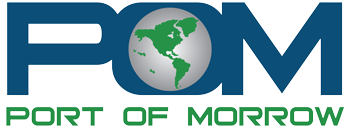The Port of Morrow has asked the Department of Environmental Quality to modify its industrial wastewater reuse permit to manage winter-season land application using a risk-based approach. The approach would allow the Port to identify fields for the winter irrigation program that have a lower risk of nitrate leaching. Port officials are seeking a decision before November when the winter growing season begins.
One component of the risk-based approach is a tool that was developed by the U.S. Department of Agriculture, referred to as the Nitrogen Index. The Nitrogen Index assigns a risk of leaching nitrate based on factors such as existing nitrogen levels in the soil, soil types, crop type and rooting depths, nitrogen volatilization and hydrology. The Nitrogen Index is meant to supplement the groundwater protection practices the Port already implements, such as prohibiting non-growing season application of wastewater to fields that are near domestic wells. It also allows the Port to consider the individual characteristics and farming best management practices of each field that would be protective of groundwater. Taken together, the groundwater protection practices, and Nitrogen Index are meant to reduce violations and the risk to groundwater during the upcoming winter season.
The Nitrogen Index relies on extensive soil testing to determine the capacity of specific farming circles to utilize nitrates without leaching. Under its current DEQ permit, the Port collects thousands of soil tests from farm parcels receiving its wastewater for irrigation. In addition, the Port will install more soil moisture monitoring equipment on fields that receive winter irrigation, providing data that will help the Port avoid over-applying water and exceeding the soils natural water holding capacity.
The proposed permit modification would also move up by a year—from November 1, 2026, to November 1, 2025—the deadline for the Port to complete wastewater storage facilities that will enable the Port to cease all winter wastewater applications. The Port’s wastewater improvement projects also include three anaerobic digesters, which are completed, and a secondary water treatment system. The proposed permit would extend the deadline for completion of the secondary treatment system to allow for construction and supply chain delays, but the new, earlier deadline for the wastewater storage facilities will enable the Port to eliminate winter wastewater applications altogether by the original secondary treatment deadline.
In addition, the proposed permit modification expands the acreage within which the Port may apply wastewater. This is consistent with the Port’s compliance plan with DEQ and reduces potential risks to groundwater by allowing wastewater to be applied less intensively and over a wider area of lower-risk fields.
DEQ currently regulates winter season water irrigation by prohibiting irrigation on all fields that exceed a low soil nitrate level in the 4th and 5th foot of soil, regardless of the field’s actual nitrate leaching risk. Engineers working with the Port have shown that the permit should consider the risk of leaching nitrate from the entire 5-foot column of soil, along with field-specific variables such as the water holding capacity and the best management practices used by farmers. In doing so, the Port can reduce the potential risk of leaching by prioritizing lower risk fields for winter irrigation until wastewater storage facilities are online.
“The idea is to limit winter water application only to fields determined to have a low risk of leaching nitrates,” explains Port Chief Operations Officer Mark Patton. “The Nitrogen Index helps us connect real world data and farming best management practices with the goals of the permit – notably, the protection of groundwater.”
